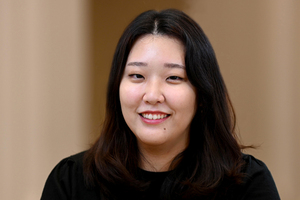
Current Master of Global Affairs, International Peace Studies student Eunhye (Grace) Lee was part of a team honored with the 2021 Canada Project of the Year Award. This is one of the International Association of Public Participation (IAP2) North American Core Values Awards and was announced on September 14, 2021.
Lee was part of a team at Simon Fraser University’s Morris J. Wosk Centre for Dialogue who developed Beyond Inclusion: Equity in Public Engagement, a handbook proposing eight principles to support the inclusion of diverse voices in cross-sector public engagement processes.
The guide grew out of a yearlong consultation process from 2019 to 2020 that involved community members, practitioners and government and civil society representatives. During the development of this piece, Lee was working as manager for signature events and endowment at the Wosk Centre, and served as lead project manager for the guidebook.
Lee was excited to get involved with this research because she could see a clear need for more inclusive public participation initiatives.
“Hearing from people with diverse lived experiences leads to more innovative ideas, better decisions, greater public support of outcomes and stronger democracies,” wrote Lee. “However, public participation initiatives often struggle to draw participants who truly represent the diversity of communities that may be impacted by a decision due to multiple systemic and structural issues. This research was meant to support public participation practitioners to explore what it would take to move beyond inclusion and towards a practice of equity—sharing power so that communities and leaders may collaborate throughout the planning, implementation and follow-up of an engagement in order to genuinely co-create solutions.”
As they conducted their interviews, the project team consistently heard concerns about ways that a focus on simply including diverse voices in a process can mask other underlying systemic inequalities. The guide proposes principles meant to help practitioners think beyond simpllistic inclusion and to start to have constructive conversations about what meaningful participation from diverse stakeholders looks like.
Lee hopes that the guide will serve as a baseline tool to help practitioners ask better structural questions before diving into a diverse engagement. And she sees connections between this research and her current peace studies classes.
“As peacebuilders, we are engagement practitioners, and we are challenged to think about how we engage with and build relationships…in addressing issues that threaten peace, whether through direct or structural violence,” said Lee. “I think it's important to continue to question and reflect on the structures of inequity and power dynamics that may deter the meaningful participation of diverse communities.”
The Kroc Institute for International Peace Studies administers the International Peace Studies concentration within the Master of Global Affairs program, housed at the University of Notre Dame's Keough School of Global Affairs.
Watch a video from the team that created Beyond Inclusion »